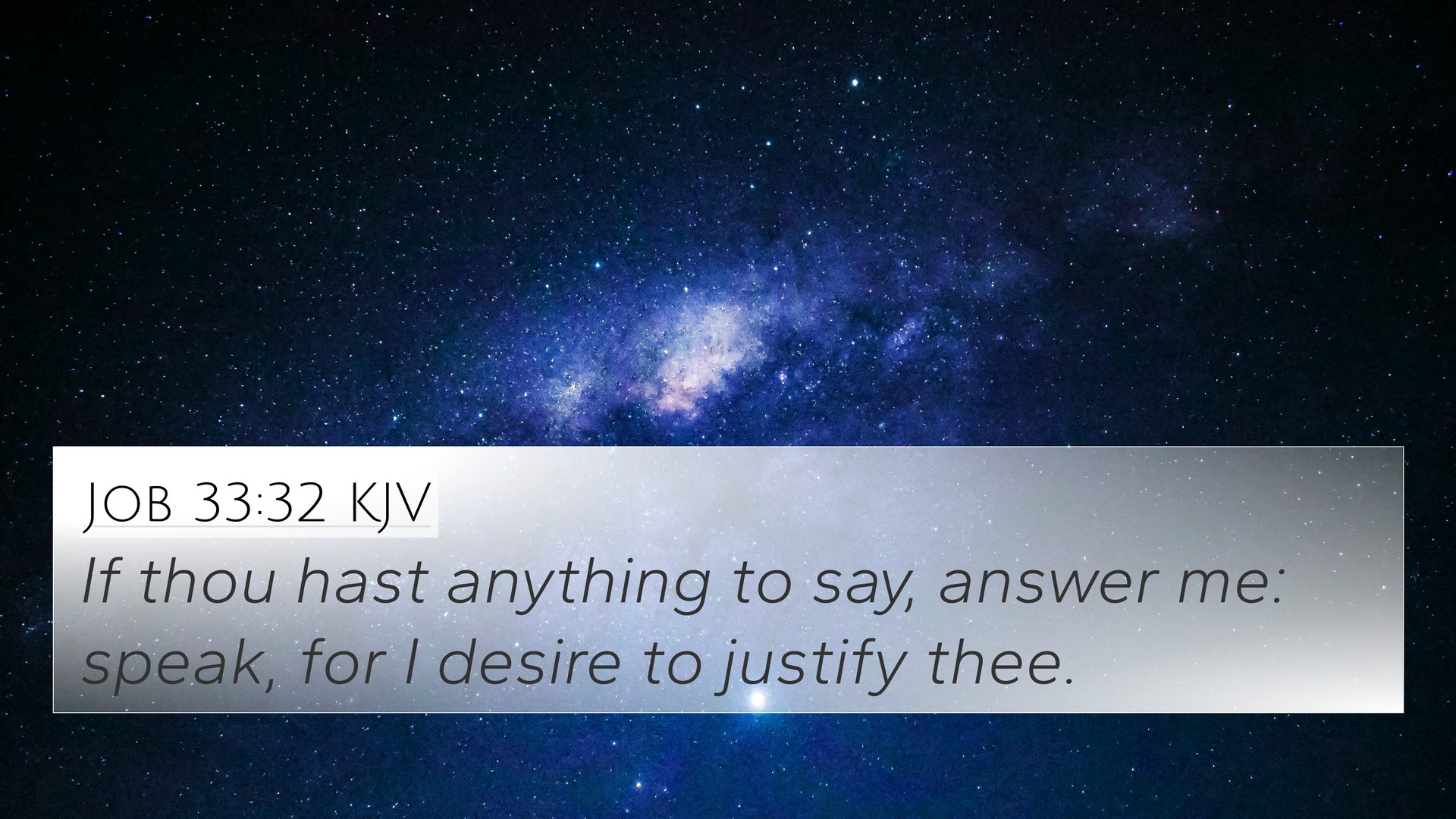Understanding Job 33:32
Job 33:32: "If you have anything to say, answer me; Speak, for I desire to justify you."
This verse is a part of Elihu’s speech in the Book of Job, where he emphasizes the importance of communication in understanding God's ways and human suffering. The verse invites dialogue between Job and Elihu, suggesting that expressing thoughts and feelings is vital for justification and clarity.
Summary of Insights
-
Matthew Henry's Commentary:
Henry highlights the role of Elihu as a mediator who encourages Job to engage in discussion. This implies that God desires an honest exchange—a theme prevalent throughout the discourse in Job. The plea to 'speak' underscores the necessity of revealing one's inner struggles to seek divine understanding.
-
Albert Barnes' Notes:
Barnes interprets Elihu's challenge as a call to Job to defend his position. This reflects the broader theme of divine justice, encouraging believers to voice their grievances respectfully. Failure to communicate can lead to misunderstandings of God's providence.
-
Adam Clarke's Commentary:
Clarke points out that Elihu's desire for Job's justification indicates God’s overarching grace. This perspective fosters hope, as it establishes that divine sympathy is augmented through human expression and acknowledgment of one's state.
Thematic Connections
The verse connects with various themes across the Bible, such as suffering, divine communication, and the righteousness of God. By inviting Job to respond, Elihu mirrors the open dialogues about God’s nature found elsewhere in scripture.
Cross-References:
- James 1:19: "Know this, my beloved brothers: let every person be quick to hear, slow to speak, slow to anger." - The importance of listening before speaking.
- Proverbs 18:13: "If one gives an answer before he hears, it is his folly and shame." -Highlighting the need for dialogue before conclusions.
- Psalms 145:18: "The Lord is near to all who call on Him, to all who call on Him in truth." - God's readiness to engage with those who seek Him sincerely.
- Isaiah 1:18: "Come now, let us reason together," says the Lord. - A similar invitation for dialogue with God.
- Romans 10:14: "How then will they call on him in whom they have not believed? And how are they to believe in him of whom they have never heard?" - Emphasizing the need for communication in faith.
- Job 13:23-24: "How many are my iniquities and sins? Make me know my transgression and my sin. Why do you hide your face and count me as your enemy?" - Job’s yearning for understanding through dialogue.
- Psalms 62:8: "Trust in Him at all times, you people; pour out your hearts before Him." - The encouragement to communicate heartfelt concerns to God.
Conclusion
Job 33:32 serves as a poignant reminder of the necessity of communication in the journey of faith. The implications of Elihu’s invitation are profound: it highlights the relational aspect of God who seeks interaction with His creation. Through this, believers are urged to express their doubts, their struggles, and their desire for understanding as they engage in a divine dialogue about their experiences. This verse, combined with its thematic connections and cross-references, provides a comprehensive lens for examining the intricacies of faith in moments of hardship.
Tools for Further Study
- Bible concordance for identifying key terms.
- Cross-reference Bible study guides to trace themes across books.
- Comprehensive Bible reference resources to delve deeper into specific verses.
Exploring Inter-Biblical Dialogues
To fully appreciate the depths of Job 33:32, readers should explore related verses to identify connections between the Old and New Testament, including narratives of suffering, justification, and divine discourse.






